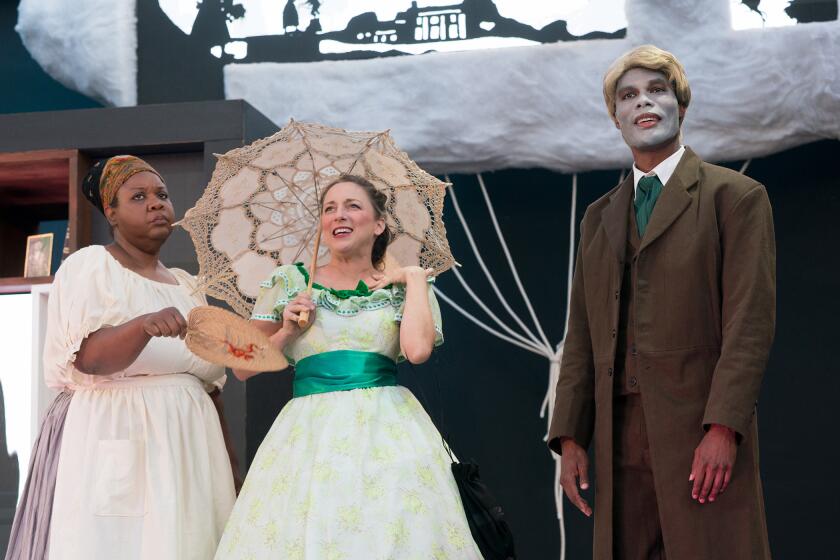Review: Killer cast, talented creatives. What went wrong with ‘Off Broadway’?

“Off Broadway,” a play by Torrey Townsend, would have been easy to ignore. But this tendentious satire of the beleaguered world of nonprofit theater has attracted the talents of serious theater artists. As such, I feel duty-bound to spell out why I think this comedy exposing institutional malpractices is itself toxic in its distortions and shallowness.
“Slave Play” author Jeremy O. Harris is presenting this streaming version of “Off Broadway” (available on Broadstream). The production is directed by none other than Robert O’Hara, who’s up for a Tony Award for his direction of “Slave Play.”
The cast, which includes Dylan Baker and Becky Ann Baker, boasts formidable acting chops. Jessica Frances Dukes and Kara Wang, who play artistic staff members of color at the fictitious off-Broadway theater, are especially vivid in their balancing of anguish, rage and disgust, the only logical emotions of their serially victimized characters.
The setting is pandemic New York, 2020. Theaters have been forced to close their doors but the nonprofit wheels continue to turn. Meetings about season programming, fundraising and marketing proceed apace on Zoom. The workplace has become even more unpredictable and desperate now that it’s virtual, but hypocritical sanctimony is still spewing from above and rebellion is still festering from bellow.
Marla (Dukes), the Black literary manager, is up in arms that the theater is planning to reopen with Arthur Miller’s “All My Sons,” directed by a white British codger whom Steph (Wang), an Asian American assistant, was surprised to learn isn’t dead. A virtual production of Tennessee Williams’ “Camino Real,” featuring an all-white cast and perversely marketed as a “Zoomedy,” adds to the sense of being trapped on a ship moving full steam ahead into an iceberg.
Daryl (Richard Kind), the artistic director of the redundantly named American National Theater, is dying and ending his reign in an alcoholic rage. Dylan Baker’s Andy, the general manager, is Daryl’s designated successor. Becky Ann Baker’s Betty, a corporate lieutenant with an understanding façade, will assume some of the GM duties when Andy takes over. Budgets are blown up, so Andy appreciates that Betty won’t need or expect a raise as a well-off married woman.
Forget musicals. The time is now for the American play, and ‘An Octoroon’ is just one of many groundbreaking works by women and writers of color.
That kind of ostentatious sexism is the norm at ANT, as is the equally egregious racism at a theater that has apparently never in its history hired a director of color for a mainstage production. The lack of self-consciousness among the artistic top brass is stunning, and Townsend’s blunt-force lampoon fails to consider the more insidious forms of systemic abuse that run rife in supposedly enlightened cultural institutions. The ability to talk the talk while reinforcing an oppressive status quo is a tricky pattern for a dramatist to capture, and Townsend opts for broad schematic laughs over subtler comic shadings.
Melodrama deals in black and white, leaving no confusion about villains and heroes. It makes a direct assault on the reptilian brains of theatergoers. The clear-cut division between good and evil is racialized in “Off Broadway,” so that all the monsters are white and all the victims and would-be saviors are people of color. This might satisfy a culture finally empowered to expose centuries of structural white supremacy, but as a dramatic model it leaves little room for complexity, contradiction, human messiness or fluctuating truth.
“Off Broadway” fires away with little historic context or insight. The dramatic canon is seen as the enemy, with no distinction between radical classics and warhorses. Lines are fudged between types of producing organizations with completely different levels of resources. The reason “All My Sons” as a title is amusing is because there have been two Broadway revivals since 2008, both of them featuring prominent Hollywood actors.
Had Townsend had more courage as a playwright he might have taken direct aim at Roundabout Theatre Company, a producing behemoth that straddles the commercial and nonprofit spheres. Roundabout’s 2019 production of “All My Sons,” directed by Jack O’Brien and starring Annette Bening and Tracy Letts, struck me when it was announced as another example of the superfluous celebrity-driven revival.
Miller’s thunderous moral reckoning with American capitalism, awakened by the ferocity of Letts’ acting, redeemed the outing to a degree. Questions remained about the direction of a prominent American theater company that are worthy of dramatic dissection. But institutional typology matters. American National Theater wants to be Every Theater and therefore is no theater at all.
Off-Broadway, which arose as an alternative to the Broadway marketplace, has been definitionally embattled from the start. The rise of off-off-Broadway in the 1960s was in direct opposition to the commercialization of an off-Broadway scene that was still in the process of establishing itself.
The margins are always shifting, as the freedom of new frontiers calls out to artists who either have no interest in selling out or are unable to do so. When I was critic and theater editor at the Village Voice, there was a growing discontent that even off-off-Broadway had been co-opted.
But the bigger anxiety had to do with the sense that to be “off” to any extent was to be rendered almost invisible. The mainstream was spreading but the avant-garde was getting pushed even further into the periphery. Media outlets, including the Voice, had cut back on theater coverage, leaving anything that wasn’t either on Broadway or bound for it in the dark or in a dusky light.
One newspaper, the New York Times, held the key to theatrical success. Theater coverage doesn’t just influence box office. It shapes a theater’s public image. It sways philanthropic foundations. And it sparks the attention of big-name luminaries, who aren’t committed to the grueling work of the stage but might be persuaded to consider a limited run, if the right vanity role could be found to boost artistic visibility.
This circle was spinning viciously not just in New York but throughout the country at regional theaters, which were cutting their own Faustian bargains with Broadway. Theater became richer in real estate and commercial revenue but the institutional culture became more homogenized. Idealists, exhausted by this hollowing out, were forced to either give in or give up.
“Off Broadway” looks at the problems from the narrow window of identity politics. If American National Theater weren’t led by drunks, rapists and white supremacists, the theater would be saved. Or so the cartoonish slant of the play suggests. To rescue the theater, Andy, a useful straw man, proposes a production of “Othello,” with Al Pacino playing the title role in blackface. Clearly, his regime needs to be overthrown.
But the pathologies are deeper and more proliferous than a set of clueless white leaders, and it’s hard to imagine how the corporate structures of nonprofit theater can be salvaged. Strained, simplistic satire that unfolds like a Zoom nightmare certainly isn’t the answer. Before there can be radical change there must be radical clarity.
The experimental opera company behind ‘Sweet Land,’ ‘Hopscotch’ and ‘Invisible Cities’ turns the artistic director position into a cooperative.
More to Read
The biggest entertainment stories
Get our big stories about Hollywood, film, television, music, arts, culture and more right in your inbox as soon as they publish.
You may occasionally receive promotional content from the Los Angeles Times.













